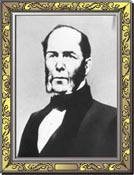| |
 |
|
Born: Cornwallis, Nova Scotia
Lifespan: 1797-1864
Nickname: "Father of Oil Refining Industry"
Occupations: Medical Doctor, 1st Provincial Geologist in Canada, 1st Chemistry professer at Dalhousie University (NS), opened 1st geological museum (NB).
Recent Sighting: Subject of a Canadian New Millennium stamp |
Abraham Gesner
Abraham Gesner (1797-1864), born near Cornwallis, NS, made major contributions to the geology of the Maritimes. As a young man, he became a keen student of rocks and minerals. But it was not until he had tried his hand at several other occupations that he became a geologist. After unsuccessful attempts at horse-trading and experimental farming, Gesner went to England to study medicine. He returned to Canada around 1826 and, for over a decade, practised medicine in Parrsboro, NS. During this time he studied the local cliffs and wrote a book on the geology of Nova Scotia, using his leisure time to study rocks.
In 1838, Gesner accepted the position of Provincial Geologist for New Brunswick, becoming the first Provincial Geologist in Canada. For four years he travelled throughout the province, mapped rocks, prospected mineral deposits and published five geological reports. Unfortunately, his conviction that coal deposits underlay a third of New Brunswick caused problems when miners failed to confirm this. Consequently, the provincial government withdrew his funding. Gesner then opened a museum in Saint John to try to earn a living by exhibiting his extensive collection of mainly geological specimens. This museum was the first of its kind in British North America and formed the nucleus of what became the New Brunswick Museum. The museum failed to make money, however, so Gesner returned to Nova Scotia to work as a doctor and to experiment, successfully, with distilling kerosene from oil shale. It was this discovery that brought him fame and, for a while, fortune.
In the late 1840s, a deposit of bitumen was discovered in Albert County in southeastern New Brunswick, and named "albertite". It was an ideal raw material for producing kerosene, so Gesner returned to New Brunswick and staked mineral claims on a property near Hillsborough. At that time, there was controversy over whether albertite was a mineral or a coal. This was an important issue, as others staked claims on the property to mine coal. Gesner lost that legal battle, as well as a battle over the patent to distil kerosene. He spent his later years working as an industrial chemist in the United States, but in 1863 (shortly before his death at the age of 66) he returned to Nova Scotia to become the first chemistry professor at Dalhousie University.
Throughout his varied career, Gesner wrote numerous scientific articles and several books, the most important being A Practical Treatise on Coal, Petroleum and Other Distilled Oils, published in 1861. This work has contributed to his recognition as the "father" of the oil refining industry. He is credited with several inventions, including an effective wood preservative, a process of asphalt paving for roads, briquettes of compressed coal dust, and a machine for insulating electric wire.
From The Last Billion Years [a book by the Atlantic Geoscience Society at the Geological Survey of Canada (Atlantic)]
|